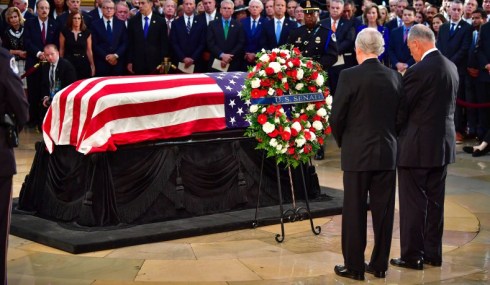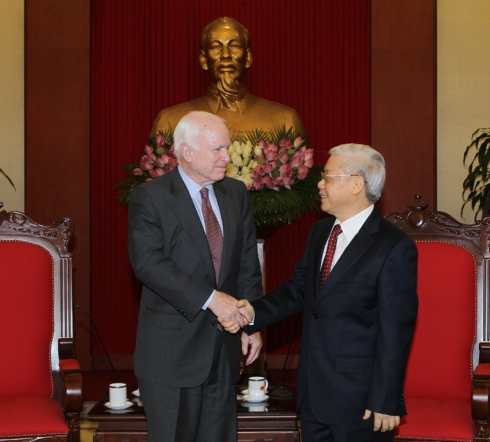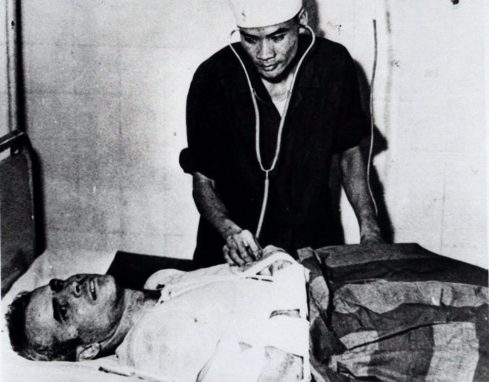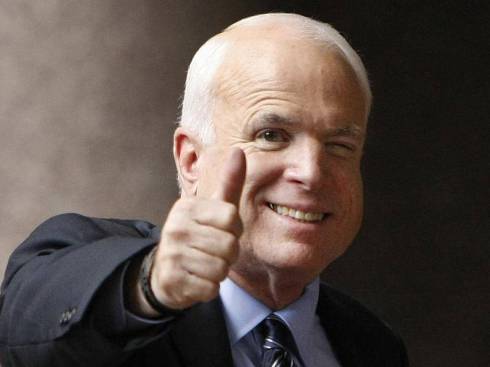
This post is a week overdue, and in our weird funhouse media environment, that might as well be eternity (I suppose I should really be writing about Burt Reynold’s death now…and maybe in a way I am). Yet the larger ramifications of this eulogy are bigger than just one moment, and since none of our leaders said quite the right thing, we have to piece meaning together on our own as the wreaths wither and the pomp dissipates.
Like a lot of American, I have been thinking about John McCain’s funeral and the legacy of one of the most eminent national leaders of our era. My feelings about McCain’ politics are complicated and are undergoing revision (indeed, my feelings about America’s “great era” during the second half of the twentieth century are likewise complex and undergoing change).

But this post isn’t about politics as such. As is traditional for a funeral piece, it is about larger issues of character and value.
During the horrible 2016 presidential campaign, Donald Trump famously cast aspersions on John McCain by saying “He’s not a war hero…He was a war hero because he was captured? I like people who weren’t captured.” The implication was that McCain was some sort of loser–one of the ultimate insults in Trump’s big book of putdowns (which the swindler apparently has held onto since primary school). I stand against Trump and the dangerous poisons he has injected wholesale into our political system, yet his imputations against McCain are worth examining…for McCain’s life was indeed deeply shaped by loss.
McCain was born into the shiny luster of deep brass: his father and his grandfather were both admirals in the U.S. Navy and it was always clear his life too would follow a path of naval service and leadership. But that path often veered into strange and horrible territory of loss and failure, to wit:
He lost his freedom during a disastrous war which we lost.
He lost years of his life to torture, deprivation, and cruel mind games.
He lost the Republican primary in 2000 (possibly due to dirty tricks) and he lost the presidency itself in 2008.
He lost his political party to Trumpism (although whenever Trump’s runaway train finally blows up, whatever Republicans are left, if any, will cravenly say that they always were always McCain style mavericks who were never fully with the Donald).
He lost a battle with cancer and he lost his life.

Yet McCain’s life was not defined by these losses. He kept stepping around them and he kept on swinging to the end. McCain never gave up. He kept on trying even despite mistakes, setbacks, or naked misfortune. If we told young John McCain in the Hanoi Hilton that he would survive and become a wild success–titanically rich, internationally known, and one of the great legislators of his day—he might have doubted us, but, clearly, he kept grasping forward despite pain and despair. The Navy’s (seldom used) motto is “Semper Fortis” which can be alternately translated as “Always Courageous” or “Always Powerful”. These different interpretations can have different…or even opposite meanings, but McCain tended to prefer the former even when it was at the expense of the latter.
One of the most pernicious forces in life is loss aversion which Wikipedia defines as the “tendency to prefer avoiding losses to acquiring equivalent gains.” Loss aversion makes people value things incorrectly. The fear of losing one’s crummy medical care makes one avoid taking steps which would provide better medical coverage. The fear of losing one’s dead-end job makes it hard to conceive us the endless possibilities for meaning and success. The fear of losing national prestige leads us down a paranoid and brutish path which self-evidently forfeits moral leadership.
Undue fear of loss is undue FEAR, or, to be blunt: people who are excessively afraid of losing things become cowards, and cowards do stupid, crazy things.
We have all lost things in life…things which haunt us. Lately we have lost things as a nation too. Most disastrously we have lost our ability to stand up for honor and fairness even if it hurts us in the short term. If we let this haunting fear creep into our hearts we will lose more things: our hard-won social gains, the great scientific discoveries of tomorrow, international prestige and the inestimable (albeit imperfect) boon of Pax Americana. We could even lose our democracy, and end up with a thing that is called a republic but which is not truly a government representative of the people’s wishes.
John McCain is gone. We have lost him (and I suspect even his detractors and opponents are already starting to feel that loss), but we can honor him in the way that he would appreciate best. We can learn from our losses and then put them behind us without letting them change who we really are or make us afraid to do what is right. That would be a true legacy, towering above a name on some building or highway. America claims to be the Home of the Brave. In his best moments, John McCain was indisputably brave. Let us all partake of this inheritance and try to be braver.


4 comments
Comments feed for this article
September 7, 2018 at 1:52 AM
Bradford Masoni
Thanks for this, Ferrebeekeeper. I would only add that anyone interested in further reading might check out David Foster Wallace’s excellent essay “Up, Simba” (in highly edited form titled “The Weasel, Twelve Monkeys And The Shrub,” and later re-released as “McCain’s Promise”), which he wrote for Rolling Stone after following McCain on the 2000 campaign trail.
September 7, 2018 at 10:28 PM
Calendar Girl
Beautiful!
October 6, 2018 at 9:21 PM
Neomys Sapiens
As anyone who lives in a country, that once was in conceivable reach of the soviets and their minions will certainly agree, it were men like John McCain that made us love the United States of America and which were responsible for the high esteem in which they were held.
October 6, 2018 at 9:26 PM
Neomys Sapiens
And it is significant and a fitting tribute in itself, that on the occasion of Sen. McCains death a language and a demeanor was appearing from many positions, which was more fitting to the political U.S. than anything heard for quite a time.